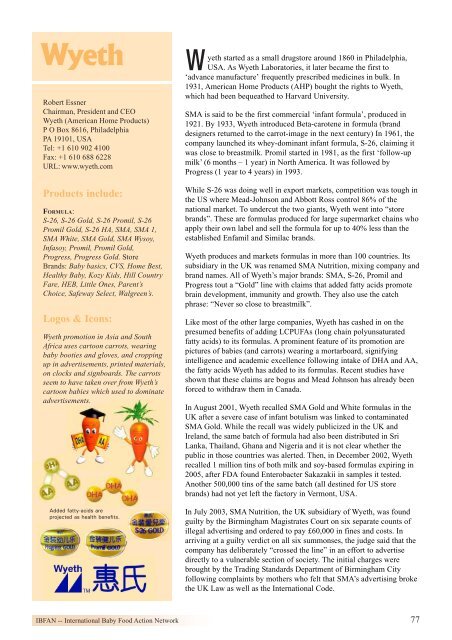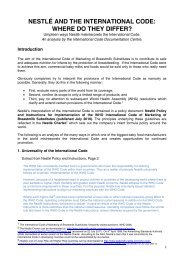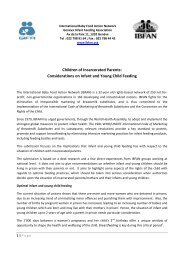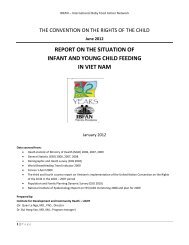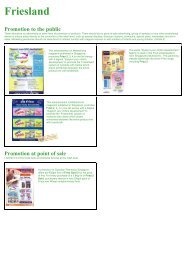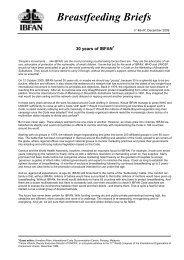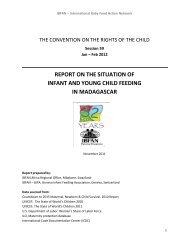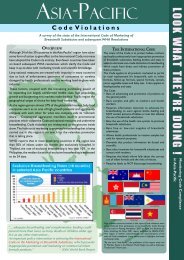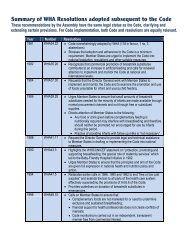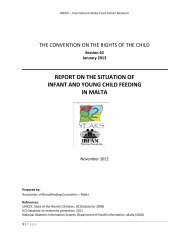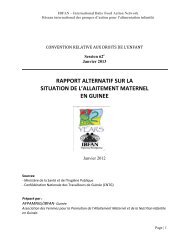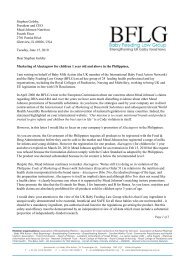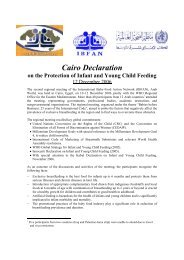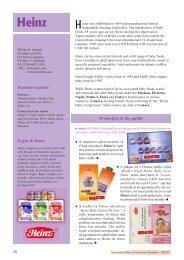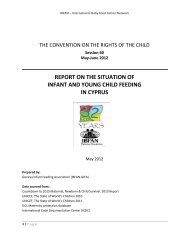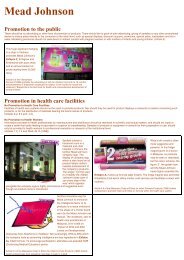Create successful ePaper yourself
Turn your PDF publications into a flip-book with our unique Google optimized e-Paper software.
yeth started as a small drugstore around 1860 in Philadelphia,<br />
USA. As Wyeth Laboratories, it later became the first to<br />
Wyeth W ‘advance manufacture’ frequently prescribed medicines in bulk. In<br />
1931, American Home Products (AHP) bought the rights to Wyeth,<br />
Robert Essner<br />
Chairman, President and CEO<br />
Wyeth (American Home Products)<br />
P O Box 8616, Philadelphia<br />
PA 19101, USA<br />
Tel: +1 610 902 4100<br />
Fax: +1 610 688 6228<br />
URL: www.wyeth.com<br />
Products include:<br />
FORMULA:<br />
S-26, S-26 Gold, S-26 Promil, S-26<br />
Promil Gold, S-26 HA, SMA, SMA 1,<br />
SMA White, SMA Gold, SMA Wysoy,<br />
Infasoy, Promil, Promil Gold,<br />
Progress, Progress Gold. Store<br />
Brands: Baby basics, CVS, Home Best,<br />
Healthy Baby, Kozy Kids, Hill Country<br />
Fare, HEB, Little Ones, Parent’s<br />
Choice, Safeway Select, Walgreen’s.<br />
Logos & Icons:<br />
Wyeth promotion in Asia and South<br />
Africa uses cartoon carrots, wearing<br />
baby booties and gloves, and cropping<br />
up in advertisements, printed materials,<br />
on clocks and signboards. The carrots<br />
seem to have taken over from Wyeth’s<br />
cartoon babies which used to dominate<br />
advertisements.<br />
Added fatty-acids are<br />
projected as health benefits.<br />
<strong>IBFAN</strong> -- International Baby Food Action Network<br />
which had been bequeathed to Harvard University.<br />
SMA is said to be the first commercial ‘infant formula’, produced in<br />
1921. By 1933, Wyeth introduced Beta-carotene in formula (brand<br />
designers returned to the carrot-image in the next century) In 1961, the<br />
company launched its whey-dominant infant formula, S-26, claiming it<br />
was close to breastmilk. Promil started in 1981, as the first ‘follow-up<br />
milk’ (6 months – 1 year) in North America. It was followed by<br />
Progress (1 year to 4 years) in 1993.<br />
While S-26 was doing well in export markets, competition was tough in<br />
the US where Mead-Johnson and Abbott Ross control 86% of the<br />
national market. To undercut the two giants, Wyeth went into “store<br />
brands”. These are formulas produced for large supermarket chains who<br />
apply their own label and sell the formula for up to 40% less than the<br />
established Enfamil and Similac brands.<br />
Wyeth produces and markets formulas in more than 100 countries. Its<br />
subsidiary in the UK was renamed SMA Nutrition, mixing company and<br />
brand names. All of Wyeth’s major brands: SMA, S-26, Promil and<br />
Progress tout a “Gold” line with claims that added fatty acids promote<br />
brain development, immunity and growth. They also use the catch<br />
phrase: “Never so close to breastmilk”.<br />
Like most of the other large companies, Wyeth has cashed in on the<br />
presumed benefits of adding LCPUFAs (long chain polyunsaturated<br />
fatty acids) to its formulas. A prominent feature of its promotion are<br />
pictures of babies (and carrots) wearing a mortarboard, signifying<br />
intelligence and academic excellence following intake of DHA and AA,<br />
the fatty acids Wyeth has added to its formulas. Recent studies have<br />
shown that these claims are bogus and Mead Johnson has already been<br />
forced to withdraw them in Canada.<br />
In August 2001, Wyeth recalled SMA Gold and White formulas in the<br />
UK after a severe case of infant botulism was linked to contaminated<br />
SMA Gold. While the recall was widely publicized in the UK and<br />
Ireland, the same batch of formula had also been distributed in Sri<br />
Lanka, Thailand, Ghana and Nigeria and it is not clear whether the<br />
public in those countries was alerted. Then, in December 2002, Wyeth<br />
recalled 1 million tins of both milk and soy-based formulas expiring in<br />
2005, after FDA found Enterobacter Sakazakii in samples it tested.<br />
Another 500,000 tins of the same batch (all destined for US store<br />
brands) had not yet left the factory in Vermont, USA.<br />
In July 2003, SMA Nutrition, the UK subsidiary of Wyeth, was found<br />
guilty by the Birmingham Magistrates Court on six separate counts of<br />
illegal advertising and ordered to pay £60,000 in fines and costs. In<br />
arriving at a guilty verdict on all six summonses, the judge said that the<br />
company has deliberately “crossed the line” in an effort to advertise<br />
directly to a vulnerable section of society. The initial charges were<br />
brought by the Trading Standards Department of Birmingham City<br />
following complaints by mothers who felt that SMA’s advertising broke<br />
the UK Law as well as the International Code.<br />
77


